Nine labels from Scotland, Northern Ireland and Wales head to Lille for final part of BFI-funded International Horizons: Scripted programme
After a week of doom-ladened warnings of the deepening crisis in British drama, one might expect that most UK execs heading to Series Mania will do so feeling downbeat.
But for at least one cohort of Lille-bound indies, the historically optimistic market and conference looks likely to be just that – somewhere that a sense of opportunity overrides the gloom currently pervading the drama landscape.
Series Mania is the culminating event of the inaugural six-month training programme International Horizons: Scripted (IH:S), which supports scripted drama companies in Scotland, Northern Ireland and Wales to scale up their skills, knowledge and networks to enable them to compete in the international scripted arena. The programme intends to return for a second iteration next year, with partners keen on collaborating.
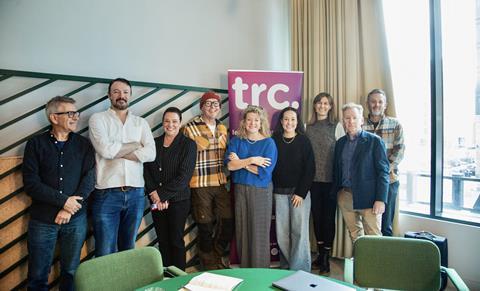
Programme convenor Caroline Levy acknowledges that within the drama world, “there is still the uncertainty and instability and that’s not going to change anytime soon”.
“All you can do as a producer is equip yourself to be smarter, tougher, leaner,” she says – and this is what IH:S hopes to offer participants.
After all, she says: “Who knows where we’re going to be in six months or a year’s time? Some drama companies are not going to survive. That is the brutality of the situation we’re in, as is applicable to many other industries.”
The programme is run by nations and regions (N&R)-focused training provider TRC and is funded through the BFI awarding National Lottery money and devolved screen agencies Creative Wales, Northern Ireland Screen and Screen Scotland.
It is the first time the three agencies have teamed up to co-ordinate an N&R training initiative, and former BBC Studios and Paramount exec Levy drew input from more than 40 local indies to design the course.
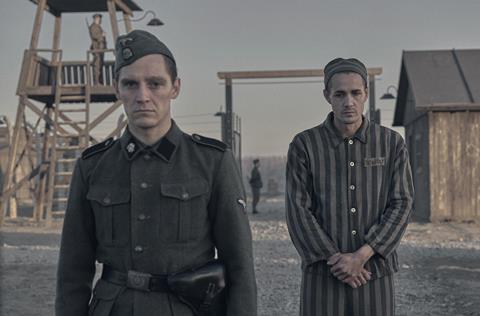
The nine successful applicants include Synchronicity Films, Black Camel Pictures and Boy 313 from Scotland; Northern Ireland’s Fine Point Films, DoubleBand Films and Village Films; and Severn Screen, Triongl and Boom Cymru from Wales.
Besides offering one-to-one consultancy and business planning, the programme sessions put the indies in front of leading commissioners, distributors and other major producers to help network and build new relationships.
While the labels’ pedigree is without doubt – Synchronicity produced The Tattooist of Auschwitz, one of Sky’s biggest dramas last year, for example – there is still a “deep frustration” among the cohort, a sense that regional are still sidelined in UK scripted and that producers with a London postcode have “easier access to decision-makers or funding”, Levy says.
“Being a producer is a very lonely business, particularly in the regions,” she adds. “And it was good for them to hear and share stories from fellow producers. They’ve become a tight group, very collaborative.”
Her point is picked up with gusto by Ed Talfan, chief exec and creative director of Cardiff-based Pembrokeshire Murders and Steeltown Murders outfit Severn Screen, who agrees that at times, it can be a lonely experience.
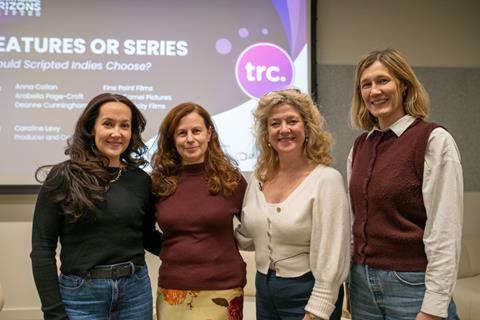
“That’s not a loaded statement – London is a global capital, if you’re in Cardiff, Edinburgh or Glasgow you can feel somewhat sidelined,” he says.
“When you’re just making your own small breakthroughs or setbacks, it’s easy to see them in isolation. The programme helped me take a step back and see there’s a pattern. It’s always market-led. When you sit in a room with similarly placed producers and hear the shared stories of successes and setbacks, you do feel connected.
“I remember thinking I’d never been on something like it, because everyone was unguarded – it’s so much more helpful to everybody to hear [their travails]. Generally, in the industry there’s a degree to which everyone is guarded. People were just very candid about the setbacks.”
Arabella Page Croft, co-founder of Annika and An t-Eilean (The Island) producer Black Camel Pictures, adds: “We’re working hard to ambitiously grow our Scottish company and we need every possible chance in the commissioning room.

“Not playing the world’s smallest violin, but truthfully, nations producers often feel like the slightly flustered, sweaty person with a wheelie suitcase – an outsider, not in the in-club.
“I’ve made incredible professional friends and colleagues from a group of ‘out of London’ producers who have the same shared experience. They all face the same challenges in the nations I do.”
Levy’s own production and executive career has spanned numerous companies and titles, with credits including Paramount+ series A Gentleman in Moscow, Insomnia and Stags, 5 returner All Creatures Great and Small, Channel 4’s Deadwater Fell, BBC3’s The Break and UKTV’s We Hunt Together. She is currently producing the follow-up to C4’s The Undeclared War, from Playground and Peter Kosminsky.
Besides hoping to initiate meetings and relationships which could lead to greenlights, Levy says one of the key aspects of IH:S is to enable indies to “refocus their slate so it is tighter, leaner and more appropriate for what the market’s seeking”. This often means being ruthless, slimming a slate down to three or four ideas and dropping “projects they have loved, but which had been on the slate for a long time and [might not go anywhere], because they were too expensive or the budgets weren’t right for the market to sustain”.

She adds: “These people are often firefighting, like me. And so it’s been a chance for them to step back from that day-to-day firefighting and really think about what do they want for their business? What kind of shows do they really want to make? How do they see themselves? Why are they different from other companies?
“I feel now that I’m part of a new movement, which is a wonderful thing, that they have changed their mindset.”
For many of the indie representatives, it will be their first trip to Series Mania, including Synchronicity head of development Deanne Cunningham. The exec, who will exec produce the upcoming adaptation of Sir Alexander McCall Smith’s Isabel Dalhousie detective novels, says the international opportunities provided by the event is paramount for most drama producers, not just regional ones.
“Where the market is at the moment, we need to be in Europe. We want to be in Europe,” she says. “We want to be having those international co-production partners because that feels like the smart way to be putting things together now.”
Once you head beyond the UK shorelines, she adds, the lop-sided N&R playing field tends to disappear.
“International buyers don’t see that regionality, it’s more meritocratic,” Cunningham tells Broadcast. “I don’t think international buyers care where you’re based in the UK. They probably see the UK as a more holistic entity.
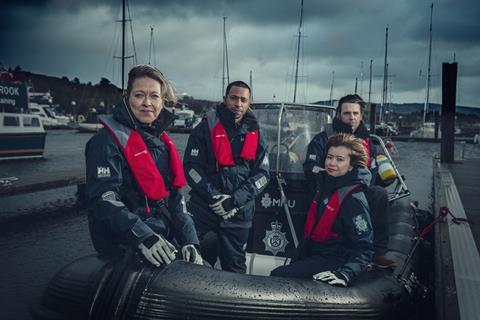
“That’s been a really refreshing part of IH:S. When we meet international buyers, they just think this is a great bunch of indies that are making great work.”
Talfan concurs, noting “international markets have confidence in what we’re doing”. Both he and Cunningham have lined up meetings with international partners in Lille, with the latter planning conversations with French and German distributors, and French, Italian and Swiss writers.
Page Croft says Black Camel is specifically “on the hunt for a brilliant, like-minded Italian co-producer” at Series Mania, to join the label’s under-wraps UK and Italy-set drama, which has distributor All3Media International on board.
“Series Mania offers an insight into where our European counterparts are and UK producers are becoming increasingly open to building these collaborations – we need to be more versatile and creative in our drama financing,” she adds.
The thorny issue of financing drama – the central concern of those affected by the crisis in the UK scripted arena – is also top of the agenda for Synchronicity, according to managing director and creative director Claire Mundell. Even the indie’s calling card, The Tattooist of Auschwitz, which was a collaboration between Sky and US and Australian streamers Peacock and Stan, came to screen some six years after Synchronicity optioned the book in 2018.
“It’s the biggest Rubik’s cube on the planet trying to make things happen,” Mundell says. “There should be an award for getting the show made, never mind is it any good. It’s a miracle that anything reaches the screen.”
Cunningham says IH:S has helped keep the label keep “laser-focused” on what are the “front-running projects” on Synchronicity’s slate.
Some producers on the programme are stepping into scripted television from different background, be it features (Fine Point and Village Films) or factual programming (DoubleBand), which Levy says has made the IH:S a “huge learning curve” for them.
Though conversations about moving into scripted TV began for the Belfast-based Fine Point a few years ago, they has kicked off in earnest after the hype around Kneecap, the comedy-drama depicting the rise of the titular Irish hip-hop trio, which stars the band members and is written and directed by Rich Peppiatt.
“We don’t want to let that experience slip away without leveraging it as much as we can,” says founder Trevor Birney. “The film has given us a platform, has provided us with a window into a bigger world. We’re getting contacted by a huge amount of people from not only the UK and Ireland but from the US as well.”
Off the back of Kneecap, Birney co-founded Coup D’État Films with Peppiatt to house scripted TV projects created by the director, on which Fine Point will collaborate. But the focus going forward is likely to be on series.
“We have one project that we had as a feature, but are now actively considering as a TV series because we know what the TV landscape looks like in terms of IP and genres,” says Anna Callan, Fine Point’s creative producer, scripted development.
She adds the specificity and universality of titles like Kneecap, BBC1’s Blue Lights or The Pembrokeshire Murders is indicative of the capacity N&R labels offers, and the IH:S programme has created a “core of companies” that Fine Point hopes to collaborate with in the future.
For Levy, it all comes back to that idea that the IH:S cohort is part of a movement.
“They don’t just classify themselves as indies from the nations,” she says. “They are producers of remarkable content of tighter, leaner, more focused slates that have as much potential to become an international co-production as anyone else.
“In fact, I think some of these indies are perhaps even better equipped than others because they’ve been used to riding the challenges and changes that we’re currently facing.”
You can learn more about International Horizons: Scripted here


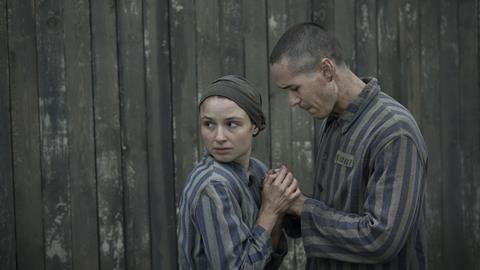






No comments yet